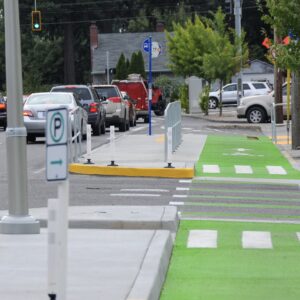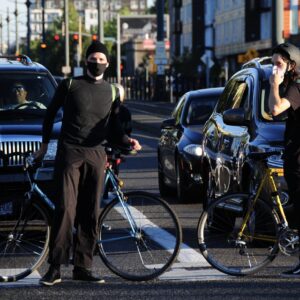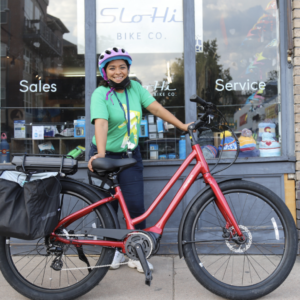(Video courtesy Willamette Week/Tech Fest Northwest)
Language Matters is an occasional column about the ways we talk about bikes and biking.
When bike believers get political, they often struggle with talking points. People who know the argument for biking in their bones can forget that those who don’t ride won’t be convinced without words.
David Plouffe has never struggled with talking points.
The Obama campaign manager and strategic advisor turned professional Uber evangelist was in town last week to speak at the annual Tech Fest Northwest conference, and his 13-minute stump speech on behalf of his current employer was a rhetorical sight to behold.
Leaving aside the debates about Uber itself, it’s worth taking a minute here to admire the work of a very talented communicator. His arguments (which preceded a somewhat less controlled sit-down interview with Willamette Week editor Mark Zusman and Mayor Charlie Hales) were meticulously sculpted, sometimes shameless, and definitely effective. Though it’s a little hard for a journalist to applaud them, they definitely made me wonder how much more effective bike advocates could be if they stole a few tricks from this bag.
4:45 – “A quarter of our trips so far start or end within a quarter-mile of public transportation. We see this all over the world where we’re operating. We are an augmentation of public transportation.”
Much like the words “hope,” “change,” and “Kennedy,” the phrase “public transportation” polls very well in American cities. And as Willamette Week reported Friday, Plouffe’s most prominent theme was to associate Uber with public transit every way he could.
Does he have a point? Well, maybe. Does the fact that a quarter of everything in urban areas probably happens within a quarter-mile of public transportation make his rhetoric any less effective? Nope. Plouffe’s tactic here is to find a statistic (any statistic) that tells a story about Uber complementing and improving public transit. In the world of bikes, where there’s a century of strong evidence that this is definitely true, this story is much easier to tell.
Advertisement
7:33 – “Thirty percent of our trips so far in the U.S. start or end at a small business. A small business. [Note: It might be worth listening to the video just to hear the way he delivers this sentence.] Many of them small businesses that are off of a public transportation line. So it was harder for them to get traffic. Now they’ve got people being dropped off at their doorstop, whether it’s a retailer or a restaurant, and in an easy, seamless way.”
What’s a “small” business? We don’t know. How “many” of them are away from public transit lines? Plouffe doesn’t have that data, but it doesn’t stop him from telling a story with it. Are Uber trips any more or less likely to land at small businesses than other trips? No matter. Again, the factoid is there to lend truthiness to the actual underlying truth, which is simply that people use Uber to get places and getting people places they need to go is generally good for the economy.
That’s not a controversial point. But the idea that a transportation system could ever include a meaningfully large number of trips by Uber — or by bicycles, or by skateboards, or by any other vehicle that doesn’t currently fit into most Americans’ daily lives — is something that many people struggle to accept. Plouffe’s factoid is mostly useless in its own right, but used here it adds a graspable bit of specificity to this abstract concept.
11:30 – “All it would take is 15 percent of Los Angeles residents to carpool, and you’d never have a traffic jam in Los Angeles again.”
When Plouffe said this, an audible gasp went around my section of the auditorium. That’s how effective it was.
This factoid is actually the mirror image of the other two: it’s true on its face, but the underlying idea is bogus. Would a 15 percent drop in traffic end congestion in L.A? Yes. But the moment that happened, Los Angeles would become way better to drive in, so more people would choose to drive more, and the roads would fill up again.
The difference by the end of that scenario, of course, wouldn’t be less congestion. It’d be something harder to explain: more capacity. L.A. streets would be as jammed as ever, but they’d be carrying 15 percent more trips with almost zero public cost.
Sounds like a best-case scenario for another type of transportation I could mention.
Rhetorical moves like these are definitely a dark art, and Plouffe got away with them in part because of the halo of goodwill that any member of “the Obama family” (as he referred to himself in his first few sentences) has in Portland. But if bike advocates are serious about winning battles for public investment, they could almost certainly learn from a pro like Plouffe. For better or worse, he knows how the game is played.







Thanks for reading.
BikePortland has served this community with independent community journalism since 2005. We rely on subscriptions from readers like you to survive. Your financial support is vital in keeping this valuable resource alive and well.
Please subscribe today to strengthen and expand our work.
Uber didn’t find its way into Portland through successful rhetoric, it got here by bulldozing its way into the niche it wanted and totally ignoring our city’s dysfunctional bureaucracy.
“Leaving aside the debates about Uber itself”…
“Learn the rules like a pro, so you can break them like an artist.” – Pablo Picasso
This is just lying by omission and obfuscating data. I’d rather not win over would-be bike advocates by laying to their faces.
I can think of a another person for whom language mattered and “never struggled with talking points”. Point is, using language to trick people into going along with your believe can be used for good or evil. I’d rather not participate and use the truth, logic, and data to convince people instead of lies.
Showing my cynical side, your desire will not achieve much as long as attention spans are 15 seconds and 8th grade is the standard for complexity of communication.
We’ll see how the “halo of goodwill” is holding up after tomorrow night’s commute.
I never thought I’d watch a 14 minute infomercial about Uber but I was wrong. That guy is slick. Kept his entire message positive.
Do you think it is true that Obama thinks about Portland? That would be so cool. Almost makes me wish I still got 10 emails a day from him.
In agreement with Adam H, this style of rhetoric depends on the audience not being critical thinkers, or informed about the issue or policy being discussed. If one question is raised shining light on the linguistic trickery, the entire speech content gets called into question.
I think there is a reason that a bull is a prop on stage.
That’s just it though. Most voters/constituents aren’t critical thinkers.
I attended this event, and the one thing that struck me was nobody asked/commented on/brought up the long litany of Uber’s sketchy and offputting behavior. i.e. the ‘fake rides’ campaign against Lyft, their sketchy comments against female journalists who have covered the company, violating rider privacy, etc.
case in point: during the Q and A Plouffe answered a comment about privacy to the effect of ‘we would never sacrifice rider privacy’ – but this is of course after uber was caught (about a year ago?) when their NY managers tracking celebrity trips – and they had also done the same with a Buzzfeed reporter, etc. Another case of “we would never do this thing” when they’ve literally been caught doing that thing more than once. And not a peep.
Thank you for the nuanced article – a very thoughtful critique of Plouffe’s fuzzy logic combined with some reflection on how we might (and might not) be getting a pro-bike message across. Fact is, it’s complicated . . .
Kudos BPO!
Thanks for seeing right through his B.S. From the depths of Hades, Edward Bernays is smiling!
Sounds very similar to almost every TED talk I’ve ever seen. Tell a good story, throw in lots of feel-good stuff, never ever ever EVER acknowledge the story you’re presenting is one-sided and omits any contradictory data or ideas.
I get it, and the choice of words it’s one of my biggest beefs with the bicycle and transportation advocacy movements. Our message to the general public by in large isn’t a very good one.
But you sit and wonder why your non riding friends and coworkers look at you like a nut job when you voluntarily subject yourself an activity which you constantly complain about. How often do you complain to these people and how often do you tell them what an awesome ride it was?
How many times do complain about some car that passed closer than you were comfortable with instead of how on the whole way to work that morning you could smell the lilacs, and watch the birds?
The overall message we send out to the public at large is that it isn’t safe, and it isn’t convenient. When in actuality, it is both safe and convenient. Could it be better? yes. But that is not the point.
Why would anyone not on a saddle want to ride a bicycle, when all they see is the people that enjoy it the most are constantly complaining?
Talking points: Tell everyone you love to feel the wind in your hair!
We’re wired to focus on the negative.
https://www.psychologytoday.com/blog/wired-success/201406/are-we-hardwired-be-positive-or-negative
http://www.theatlantic.com/health/archive/2013/10/how-to-build-a-happier-brain/280752/
This is so true. But it’s not so much cycling advocates or people currently cycling that are emphasizing the negatives. It’s the (car industry supported) mainstream media who highlight the times when things are scary and ignore when it’s good except for “cod liver oil” pieces.
By that I mean pieces where the message is “it’s good for you but you won’t like it.”.
Reasonable sensible people don’t end up in the news. I’ve been interviewed about cycling issues a few times now and I’ve never ever been included in the final piece. I suspect it was because I make too much sense and I’m sensible and have a well balanced view of the overall picture. Therefore I’m of no use to them. They want conflict and controversy and a good fight for people to watch.
Don’t kid yourself, the advocates are worse than the car industry in unintentional bicycle shaming. And though somewhat off base, in many ways some of them are coming back to the bicycle. They’ve seen the light so to speak. Many are experimenting with e bikes, and bikes that transform into other parts of a car -(please note I don’t include Volvo in this group). And honestly, it makes sense since the bicycle industry pretty much morphed into the automobile industry in the early 1900’s.
But it runs much deeper than complaining to co workers and friends, the negative bicycle message is looming present in nearly every aspect of the US bicycle advocacy movement.
It is there in the way the data is presented, the way it’s gathered, and the way we talk about it. Think about how many times you’ve read about someones great (or even not so great) ride that doesn’t involve a critique of the infrastructure of the ride, over how many times you’ve read about the need for helmets, bike lanes, cycletrack, reflective vests, traffic calming etc.
And those that are yelling it the loudest are here in the comment section, the government officials, the other advocates – not the car industry.
Yes I do understand that it is a Catch-22 in wanting to improve what is already great, but the constant war drum pounding might get some temporary action from city hall, but likely leaves little in the way of interest to the general public. Building infrastructure will only get you so far without demand for the infrastructure.
In the long run it’s better to get the general public on your side. “The Safety in Numbers Rule” has more implications than just awareness of riders on the street, it also means more money and desire by the public for the improvements that so many here are so desperate for.
I have told co-workers what an amazing commute I have. I go down streets with flowering trees on both sides, then near a cool geodesic dome and ocean inlet, amazing architecture, geese and herons.
I don’t know if it changed their viewpoint but that wasn’t why I was telling them anyway.